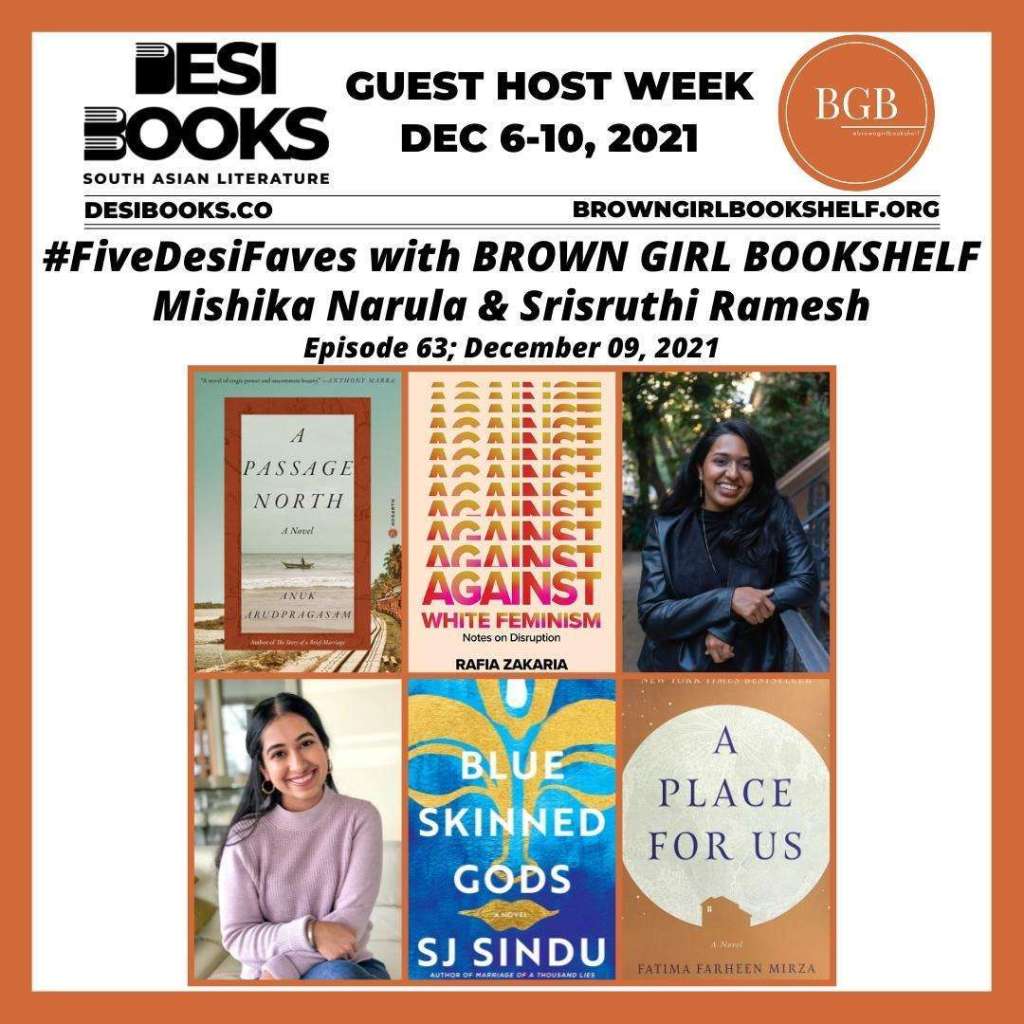

Desi Books Ep 63 w/ Mishika Narula and Srisruthi Ramesh (guest hosts: Brown Girl Bookshelf) – Desi Books
Hello and welcome to Episode 63 of Desi Books—news and views about desi literature from the world over. I’m your host, Jenny Bhatt. Thank you for tuning in.
In today’s #FiveDesiFaves episode, we have Mishika Narula and Srisruthi Ramesh of Brown Girl Bookshelf sharing their recently-read favorite desi books by Anuk Arudpragasam, Rafia Zakaria, SJ Sindu, and Fatima Farheen Mirza.
#FIVEDESIFAVES WITH BROWN GIRL BOOKSHELF — INTRODUCTION
Mishika Narula is the lady behind the lens and leads partnership marketing at BGB. She is a champion of physical books over e-readers and finds it unnatural to text without perfect grammar. Outside of BGB content, she expresses her creativity best in the kitchen.
Srisruthi Ramesh is the head of strategy & design for BGB. She is also known to be an amateur philosopher, eye-balling cook and baker, elaborate storyteller, and to move to small remote towns on a whim.
The transcript of this episode will soon be up on the website at desibooks.co.
And now, here are Mishika and Sri with their #FiveDesiFaves.
#FIVEDESIFAVES WITH BROWN GIRL BOOKSHELF
[The conversation transcript to be added shortly.]
[Publisher’s Note] A Passage North begins with a message from out of the blue: a telephone call informing Krishan that his grandmother’s caretaker, Rani, has died under unexpected circumstances—found at the bottom of a well in her village in the north, her neck broken by the fall. The news arrives on the heels of an email from Anjum, an impassioned yet aloof activist Krishnan fell in love with years before while living in Delhi, stirring old memories and desires from a world he left behind. As Krishan makes the long journey by train from Colombo into the war-torn Northern Province for Rani’s funeral, so begins an astonishing passage into the innermost reaches of a country.
At once a powerful meditation on absence and longing, as well as an unsparing account of the legacy of Sri Lanka’s thirty-year civil war, this procession to a pyre “at the end of the earth” lays bare the imprints of an island’s past, the unattainable distances between who we are and what we seek. Written with precision and grace, Anuk Arudpragasam’s masterful novel is an attempt to come to terms with life in the wake of devastation, and a poignant memorial for those lost and those still living.
Read the Brown Girl Bookshelf review on Instagram.
Read Jenny Bhatt’s NPR review of A Passage North.
[Publisher’s Note] Upper-middle-class white women have long been heralded as “experts” on feminism. They have presided over multinational feminist organizations and written much of what we consider the feminist canon, espousing sexual liberation and satisfaction, LGBTQ inclusion, and racial solidarity, all while branding the language of the movement itself in whiteness and speaking over Black and Brown women in an effort to uphold privilege and perceived cultural superiority. An American Muslim woman, attorney, and political philosopher, Rafia Zakaria champions a reconstruction of feminism in Against White Feminism, centering women of color in this transformative overview and counter-manifesto to white feminism’s global, long-standing affinity with colonial, patriarchal, and white supremacist ideals.
Covering such ground as the legacy of the British feminist imperialist savior complex and “the colonial thesis that all reform comes from the West” to the condescension of the white feminist-led “aid industrial complex” and the conflation of sexual liberation as the “sum total of empowerment,” Zakaria follows in the tradition of intersectional feminist forebears Kimberlé Crenshaw, Adrienne Rich, and Audre Lorde. Zakaria ultimately refutes and reimagines the apolitical aspirations of white feminist empowerment in this staggering, radical critique, with Black and Brown feminist thought at the forefront.
Listen to a #DesiCraftChat conversation with Rafia Zakaria, guest-hosted by Mishika Narula and Srisruthi Ramesh.
Read Jenny Bhatt’s NPR review of Against White Feminism.
[Publisher’s Note] In Tamil Nadu, India, a boy is born with blue skin. His father sets up an ashram, and the family makes a living off of the pilgrims who seek the child’s blessings and miracles, believing young Kalki to be the tenth human incarnation of the Hindu god Vishnu. In Kalki’s tenth year, he is confronted with three trials that will test his power and prove his divine status and, his father tells him, spread his fame worldwide. While he seems to pass them, Kalki begins to question his divinity. Over the next decade, his family unravels, and every relationship he relied on—father, mother, aunt, uncle, cousin—starts falling apart.
Traveling from India to the underground rock scene of New York City, Blue-Skinned Gods explores ethnic, gender, and sexual identities, and spans continents and faiths, in an expansive and heartfelt look at the need for belief in our globally interconnected world.
Read the Brown Girl Bookshelf review on Instagram.
Listen to a #DesiCraftChat conversation with SJ Sindu.
[Publisher’s Note] As an Indian wedding gathers a family back together, parents Rafiq and Layla must reckon with the choices their children have made. There is Hadia: their headstrong, eldest daughter, whose marriage is a match of love and not tradition. Huda, the middle child, determined to follow in her sister’s footsteps. And lastly, their estranged son, Amar, who returns to the family fold for the first time in three years to take his place as brother of the bride. What secrets and betrayals have caused this close-knit family to fracture? Can Amar find his way back to the people who know and love him best? A Place for Us takes us back to the beginning of this family’s life: from the bonds that bring them together, to the differences that pull them apart.
All the joy and struggle of family life is here, from Rafiq and Layla’s own arrival in America from India, to the years in which their children—each in their own way—tread between two cultures, seeking to find their place in the world, as well as a path home. A Place for Us is a book for our times: an astonishingly tender-hearted novel of identity and belonging, and a resonant portrait of what it means to be an American family today.
You’ve been listening to episode 63 of Desi Books—news and views about desi literature from the world over. I’m your host, Jenny Bhatt. Thank you for tuning in. Today’s #FiveDesiFaves episode was with Mishika Narula and Srisruthi Ramesh of Brown Girl Bookshelf sharing their recently-read favorite desi books. The transcript will be up soon on the website at desibooks.co.
Episode 64 will be up shortly. Follow on Twitter @desibooks, Instagram @desi.books, Facebook @desibooksfb. Please tag the accounts if you have requests or suggestions. Go to the website if you’d like to sign up for the free, weekly newsletter. You’ll get all the updates you might have missed as well as some new stuff. And please share this on via social media if you enjoyed listening or reading. Help raise the tide of South Asian literature.
Stay healthy, keep reading, and write well.
NOTE: If you like the work being done at Desi Books, you can leave some appreciative feedback and sign up for the free, weekly newsletter. And please share this with other readers who might be interested. Remember: A Rising Tide Lifts All Boats.™
Join the Conversation




